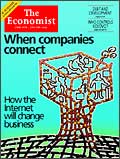| LEADERS | ||||||||||||||||
| When companies connect | ||||||||||||||||
|
New technologies have always changed the world in unforeseeable ways. Who could have
imagined, when the first car rolled along a road, how that invention would alter shopping,
urban design or courtship? When Faraday experimented with electricity, who foresaw the
coming of the skyscraper, its lifts driven by electrical power, or the movement of women
into the workplace, their domestic productivity transformed by the washing machine and
vacuum cleaner? What connection did anyone make between the arrival of television and the
future of political debate, or of branded goods? It is a clich� to say that “the
Internet changes everything”: the challenge now is to guess what, how and how
quickly. |
|||||||||||||||
| Wiring the familiar | ||||||||||||||||
| It may, as Marshall suggested,
take a generation to see how the Internet reshapes society and human behaviour once it
becomes a mature technology. But the reshaping of business is already happening, and much
faster than is often appreciated (see our survey). Most popular guesses about the Internet’s commercial
future have concentrated on fashionable new companies run by geek billionaires. It is
dizzyingly rated firms such as Amazon, Yahoo! and eBay that have hogged the limelight. Yet
far more significant is the effect the Internet will have on established companies. One forecast: although a few familiar names and even whole businesses may vanish forever, most large companies with established brands should survive and prosper from the spread of the Internet. Ten years hence, Amazon is unlikely to have wiped Barnes & Noble off the face of the earth, and E*Trade will probably not have killed off Merrill Lynch. Indeed, it is the move of established firms on to the Internet that seems likely to drive this technology forward to maturity. “The storm that’s arriving,” said Lou Gerstner, chief executive of IBM, a few weeks ago, “is when the thousands and thousands of institutions that exist today seize the power of this global computing and communications infrastructure and use it to transform themselves. That’s the real revolution.” In the immediate future, that revolution will not be mainly about how business communicates with and sells to consumers. That is indeed changing, but it is likely to happen on a smaller scale, and more slowly, than the change in the ways that businesses communicate and trade with each other; and also than the changes within companies. Thus, business-to-consumer electronic commerce remains modest in scale—perhaps $8 billion last year in America, according to Forrester, an American consultancy, compared with $43 billion-odd of business-to-business e-commerce. In the near future, retail commerce may hit obstacles. It has grown faster inside the United States than outside it, even though the biggest impact of the new technology may well be felt when consumers learn to use the border-hopping properties of the Internet to shop all round the world. In Europe, the Internet will help to turn the single currency into the foundation of a genuine single market for consumers. Yet Europeans are less prepared than Americans to buy electronically: they are less likely to have credit cards, have less experience of mail-order shopping, and are generally more conservative in their shopping habits. Even in America, reckons Forrester, business-to-consumer commerce in 2003 will be worth no more than $108 billion, less than Wal-Mart’s 1998 sales. Business-to-business e-commerce, in contrast, might well top $1.3 trillion in 2003. For
all sorts of reasons, businesses are more likely than consumers to buy and sell online.
They are better equipped and connected, more used to trading at a distance, more
cost-conscious. Besides, electronic corporate trading has a rapid multiplier effect. Once
large firms move their purchasing online—as, say, GE has done
with its Trading Process Network, on which suppliers can bid electronically for components
contracts—business partners and suppliers will have to do the same. It will become
progressively harder for firms that cannot or do not want to trade online to survive. |
||||||||||||||||
| The Hollywood effect | ||||||||||||||||
| Nor will it be only trading
between companies that is transformed. Companies themselves are likely to be reshaped.
Managers will find that the Internet gives them lots of ways to do things better, faster
and cheaper than now. Improvements in efficiency will come from switching paper-shuffling
online, from reducing transaction costs, from making information more widely and quickly
available, and from using it more effectively. The long-awaited computer-driven boost to
productivity, not least in management, is about to arrive. The boundaries of companies will also change. Once, a Hollywood studio employed everyone from Humphrey Bogart to the lighting technicians. Today, it is more like a finance-house-cum-marketing-department. Studios have retreated to their core roles: for a film, they now assemble the teams of self-employed people and small businesses that are today’s stars and technical support. The Internet will push other industries in the same direction. Companies will find it easier to outsource and to use communications to develop deeper relations with suppliers, distributors and many others who might once have been vertically integrated into the firm. Indeed, vertical integration is likely to become less attractive; instead, the diplomatic art of managing ad hoc partnerships and alliances will become a key executive skill. Many companies may end up as loose agglomerations: networks of smaller firms or individuals bound together by corporate culture and communications. And not only companies. The public sector could follow suit, as governments find that provision of services becomes easier to monitor and measure—and so to outsource—in the new world of the Internet. Hollywood-style government: now there’s an epoch-making idea for our wired future.
|
